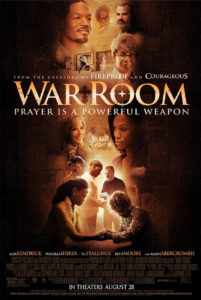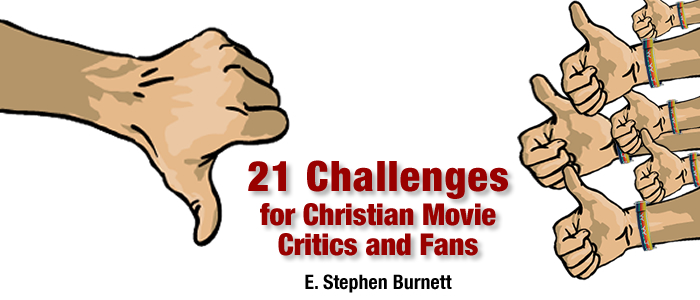Seven Challenges For Christian Movie Critics and Fans
Do you like Christian movies pretty much as they are now and think we should have more?
Do you dislike Christian movies as-is and wish they would either grow up or go away?
Do you generally ignore both fans and critics of Christian movies in favor of other movies?
In any case, here are seven challenges that apply to all of us.
1. What are movies meant to do?
Some answer, “To entertain.” Some answer, “To send a message,” that is, to teach.
Specifically about Christian movies, some answer, “To use the method of entertainment to teach Christian living, or to evangelize people who would not otherwise visit a church.”
These may be good reasons, but are these the primary reasons we should enjoy movies?
Imagine a world in which humans had never sinned. Would we have someday made movies as well as other stories and songs? If so, what would our movies be meant to do? Certainly today’s movies must not pretend our world is sinless. But is there anything we would have done with movies in a sinless world that we should also try to do with our movies today?
What is the chief end of man (God’s creation)?
Based on that answer, what is the chief end of movies (man’s creation)?
2. Why do we actually like Christian movies?
 A friend reminded me that it’s wise to ask Christian movie fans why they like movies such as Fireproof, Courageous, God’s Not Dead, Heaven Is For Real, and the recent War Room.
A friend reminded me that it’s wise to ask Christian movie fans why they like movies such as Fireproof, Courageous, God’s Not Dead, Heaven Is For Real, and the recent War Room.
But when I ask this question, will some people give answers like these?
- We need a tool for evangelism, to reach unbelievers in a place outside the church.
- We need a tool to teach morality to Christians, such as prayer and family values.
- We need a tool in the “culture war,” to remind Big Hollywood that Christians exist.
Are these good answers? Are they honest answers? Or might they be mixed up with other, possibly more-honest reasons why we like Christian movies—reasons like these?
- I want to feel like someone, at least, is doing effective evangelism in the real world.
- I want to enjoy the humor and fun that’s safe and non-offensive for the whole family.
- I want to see “me” onscreen, especially when other movies don’t show Christians.
If we like Christian movies, how can we share with one another the real reasons why?
3. Why do we actually dislike Christian movies?
Now for the other side. I feel I need not ask actual Christian movie critics for their reasons, because I read their critiques, such as a negative review of War Room at Christianity Today.
But if I asked for three reasons to critique or dislike Christian movies, replies may include:
- We need a tool for better evangelism, to reach unbelievers outside of a church.
- We need a tool to teach better morality to Christians, such as the evils of racism.
- We need a tool to push back against the sentimentalist Christian subculture.
Are these good answers? Are they honest answers? Or might they be mixed up with other, possibly more-honest reasons why we dislike Christian movies—reasons like these?
- I want an outlet for my own embarrassment about beliefs Christians actually hold.
- I want more movie conversations about social/political issues I’m passionate about.
- I want to see an end to the type of Christianity I learned as a child and now dislike.
If we dislike Christian movies, how can we share with one another the real reasons why?
4. If sermons shouldn’t be like movies, why should Christian movies be like sermons?
Most Christians, if asked, would agree they do not believe sermons in church should be all about entertainment. Sermons can be interesting and include entertaining examples when appropriate, but above all they should be biblical. What if a church pastor failed to open the Bible—or even quote a Bible verse or truth—and instead played a movie for the whole time? Almost all Christians, even from the hippest megachurches, would disagree with that.
Why then should we insist, or even suspect, that a Christian movie ought to be like a pastor’s sermon or at least like an anecdote from a pastor’s sermon?
Hasn’t God already appointed two great means for us to understand of His word: preaching and teaching? Did He not instruct teaching elders to teach the word, exploring Scripture aloud in the context of institutional local-church worship? Don’t we also have nonfiction books and reading plans and other lessons to pursue this goal even outside of church?
If so, why do we need Christian entertainment that serves exclusively as sermons?
5. If Christian movies are like Christian sermons, are they at least good sermons?
 Let us go further. Let’s grant that Christian movies can be like sermons. (The opposite view seems legalistic.) In that case, the Christian movie must play by sermon rules. That means:
Let us go further. Let’s grant that Christian movies can be like sermons. (The opposite view seems legalistic.) In that case, the Christian movie must play by sermon rules. That means:
- The movie must stick with a biblical text (expositional preaching), or as in some evangelical circles, at least stick with a biblical theme with texts (topical preaching).
- The movie must not seem to endorse some kind of behavior that is not biblical.
- The movie must fiercely strive to avoid teaching anything that is un-biblical—such as false gospels, mystical notions about prayer, nasty acts toward our neighbors, or the notion that Jesus is like a genie who grants wishes if we only wish hard enough.
- The movie must be good, with original work, mindfulness of symbols and images, and good organization, flow, editing, words, and realism yet appropriate idealism.
- The movie must stay focused 100 percent on the Person of Jesus Christ, and only secondly emphasize results of Jesus’s work, such as biblical doctrine and behavior.
- The movie must be realistic about human nature, showing that people can try hard and fail anyway, that nonbelievers do good things, and that Christians can be nasty.
- The movie, even a lighter movie, must show both a realistic vision of what the world is like and a profoundly gospel-centered vision of what the world should and will be.
Do most Christian movies-as-sermons go in this direction? If not, how could they improve?
6. If we think Christian movies are bad art, do we simply show/tell Christians better art?
Some say it’s pointless to critique Christian movies. They say: Just make better movies.
Making and showing someone better movies may be necessary. But should Christian movie critics also do some loving teaching about why Christians should do art? Should we gently and directly challenge some bad ideas about creativity that Christians have absorbed?
Should we consider avoiding some of our many critiques about editing, dialogue, and plot clichés that are arguably subjective and will confuse a Christian who isn’t a film buff? Could we instead focus on Scripture’s arguably mandatory commands to train one another in better theology about why God redeems humans and what humans do as a response?
Will this focused teaching naturally lead to higher expectations from movies and art?
Will such a focused teaching actually be more missional—reaching some Christians where they are, using things they recognize (such as overt teaching) to help slowly change minds?
7. What should we want to do as soon as we leave a Christian movie?
 I admit I thought this question as a response to War Room. I have not seen the film and will not review or critique it. But all promotions and reviews indicate the purpose of the film is in short to share a story that will help families and churches commit to prayer revival.
I admit I thought this question as a response to War Room. I have not seen the film and will not review or critique it. But all promotions and reviews indicate the purpose of the film is in short to share a story that will help families and churches commit to prayer revival.
In this case, may it be fair to suggest these answers by fans of particular Christian movies?
- Fireproof—You will enjoy the story and commit to strengthening your marriage.
- Courageous—You will enjoy the story and commit to being a better father.
- God’s Not Dead—You will enjoy the story and commit to telling others God is alive.
In either case, the movie’s goal may be to get viewers to enjoy the movie, yes, but then also to do something else. Perhaps a movie can indeed rightly get viewers to engage in a social action. But is that the first or primary response Christians have after we enjoy a story?
Are good movies, though made by human beings, ultimately a gift of God? If so, what does He say about what our first response should be when we receive His gifts to us?
When God gives us a gift, must we first go do something? Or should we do something else?
Next: Seven More Challenges for Christian Movie Critics and Fans.






























I loved all the movies you mentioned, except God’s Not Dead, because I haven’t seen it. The answer isn’t cut, clear, and dry as some would like to think and I believe your post responded to the problem about Christian entertainment by providing the challenges that face those who want to create Christian movies.
Honestly, as a writer of what is considered edgy Christian romance and spec fiction, I think our entertainment can be more than just feel goodies. Then again, there’s nothing wrong with wanting to protect your mind from sinful acts and thoughts. Some people want affirmation of their faith. Others want to be challenged to strive further. More still seek to always delve deeper into the mystery of God and how He takes the filth of sin and turns it into gold. Gosh, how He still continues to take this idiot girl (me) and still call her His daughter is downright mind-boggling. And humbling.
I look forward to how others respond to the post. Thank you!
I agree. I hate over the top, sentimental Christian moves that make me roll my eyes and think, really??? I also hate it when the writer needs to explain something for me b/c I might not get it. I will get it. I also write a little edgy fantasy, so I”m not afraid of edgy as long as it not super sexual sex scenes that would make a sailor blush. I think it’s ok to add a little more emotions to the movie. Why should Hollywood make all the cool movies? It seems the christian writing world is a bit scared about stepping in real life for fear of ‘offending’ someone. PFFFTHHH!!! Who cares?
That was far too well-stated for you to be calling yourself an idiot. 🙂
Excellent post. this is actually a topic I’ve adressed before personally.
See, I have a Christian Geek podcast, and we have talked about this only a few weeks ago.
Christian Copycats: http://upstreampodcast.blogspot.com/2015/08/episode-11-christian-copycats-really.html
Christian Media: Subtle or Overt? : http://upstreampodcast.blogspot.com/2015/07/episode-7-christian-media-subtle-or.html
Lake? Lake, is that you? It’s Galadriel from the DioM forum…
Hey Gala! Long time no see!
And yes, indeed, I am the exact same Lake.
Hmm. Well, I can’t say I’ve never seen a Christian movie, because I have. Mainly I haven’t enjoyed them, because I get irritated at the cliches and the (sometimes) out and out false doctrine I see portrayed. There have been others I have liked a great deal more, as they have avoided those two errors, but I have to say those are few and far between. Basically I avoid Christian movies, to be honest.
I would definitely agree with this: But should Christian movie critics also do some loving teaching about why Christians should do art? Should we gently and directly challenge some bad ideas about creativity that Christians have absorbed?
But I disagree with this: Should we consider avoiding some of our many critiques about editing, dialogue, and plot clichés that are arguably subjective and will confuse a Christian who isn’t a film buff? I don’t agree that these things are subjective. And certainly, those who MAKE Christian films should be well conversant in these things, don’t you think? If you don’t understand the basic tools, why are you doing the job? What you end up with is a slipshod and shoddy construction, which is basically how I feel about most Christian movies. Heart in the right place, but please….give your audience some credit for understanding subtlety and for being comfortable with being left with questions, not being hammered over the head with the “answer” over and over.
I suppose this would speak to “who is the audience you are trying to reach?” If the audience is strictly the Church, I think you can be a little more direct. But, please, here and there give us some “meat” along with the milk. But if you think your film is going to be promoted to and seen by secular culture, well….just keep in mind that Jesus only spoke parables to the crowds. He kept the explanations for the disciples.
Another question we can throw in there is how much audiences are willing to forgive. Some of us can forgive a horrible script if there’s enough CGI explosions. Some of us can forgive amateur & cheap effects if the story’s good enough. But I think the kicker is that only Christian audiences can forgive a movie for being badly written and on the amateurish and cheap side because it’s got a Christian message.
Let’s take a moment to let the reality sink in: entertainment beats edification just about every time. I would much rather watch Veggie Tales’s Lord of the Beans because it’s at least halfway clever at spoofing LOTR than Fireproof, Facing the Giants, and especially Flywheel (there’s a reason we never heard of Flywheel until that company got famous with the others).
Ditto on Lord of the Beans. In some ways, I am glad that VeggieTales went for parodies instead of containing to do Bible stories.
Ooh, I’ve got to disagree here. I love the parody stories–Lord of the Beans, Minnesota Cuke, Veggies in Space, and the like–but I miss the Bible stories. Maybe it’s because I grew up with them, but Josh and the Big Wall, King George and the Ducky, and others were great at helping me understand Bible stories in a big-picture way. Jonah was especially deep because it didn’t provide a perfect, everything’s-good ending. Maybe it’s just that those are better for kids than for adults.
Hmm, these are good meat for thought.
When I think about why Christian movies generally are not that good there’s a lot that comes to mind. Having to work on a low budget could be one issue, but I don’t think that’s the main reason.
I get a sense that there’s a strong “seeker-sensitive” influence on those making these movies. I think they’re trying to be Christian-Enough to attract a Christian audience, but Not-So-Christian that it turns off more of a mainstream audience. I think the result is that they usually don’t end up winning over either audience.
Thing: http://www.firstthings.com/blogs/leithart/2015/09/why-evangelical-films-fail
Notleia, someone else shared that piece which I read a couple of days ago. I think it’s a great challenge to the underlying perceptions of faith that some Christians have. We tend to see the words God has communicated to us as means to, well, more words, rather than as vital means of having our eyes opened to everything–first and foremost Jesus Christ, and secondly other people, and thirdly our world and how it is versus how it should be.
From this article:
My Christ and Pop Culture colleague Christopher Hutton incidentally rebuts this notion in his new review/article about War Room at The Federalist.
This is disappointing to hear. I’ve had higher hopes for the Kendrick brothers’ storytelling because of the genuine human moments in some of their last movies. But it appears these are incidental to the main mission of the movie: to promote a Message–which ends up not only failing to promote a Message but often ends up promoting some very incorrect messages.
I’ve never really seen a need to separate “Theme/Message” from “Entertainment,” as in my experience the best stories do both. The biggest problem for me, personally, is that Christian film tends to fall into two categories: kids’ films or “Hallmark.” And, ultimately, I don’t really like Hallmark movies. It’s not my thing. I really don’t see myself in them, and I grew up in the biggest Christian bubble possible.
But really, I think Christian film needs to figure out how to show real themes and real people without compromising its hallmark (no pun intended) for keeping immoral behavior off-screen. We see it done all the time elsewhere, and I see no reason for Christian film not to capitalize on that storyteller’s toolbox. (And sometimes I just think viewers need to put their big kid pants on.) That inability or unwillingness to actively deal with sin and darkness and evil is, I think, largely why so much of the message winds up flat or askew with Scripture.
Personally, I think the Christian film buffs tend to feel somewhat strapped. They know how to do it, but when organizations like the Dove Awards will disqualify you over a list of things, their hands get tied.
In this case, may it be fair to suggest these answers by fans of particular Christian movies?
I haven’t seen Courageous, or most of God’s Not Dead (because after Unstoppable I just gave up on the genre), however, I have to say I couldn’t actually enjoy Fireproof for two reasons: one, it didn’t press any of the real issues far enough, at all, and, two, I was too distracted by how badly the movie failed to address the wife’s infidelity whatsoever.
As for God’s Not Dead, the parts I did watch reminded me way too much of an old scare tactic people used to use to keep kids away from smoking. (I know peer pressure is a thing, but the first time I was offered a cigarette it was with no more effort than offering a stick of gum.) That professor…Kevin Sorbo did much too good a job at playing a length of colorful words I will not type. I am not sure how much “evangelism” is accomplished by painting atheists as psychotic professors out to fail their students for their religious beliefs, especially in such an openly disgusting manner. That was a wonderfully villainous character, but he was offensive to me, and I’m a Christian. It just seemed to play off stereotype, scare-tactic, and an “up yours” attitude that I’m not sure is something Christian film should be known for. If that was supposed to be a “seeker-friendly” movie, it wasn’t; and if it was supposed to educate Christians, it didn’t.
Update: Yesterday the trailer released for God’s Not Dead 2.
I’m not fan, really, but perhaps what’s most hilarious is the amount of critics who are going, “haw, haw, it releases April 1 and this movie is a joke.” They have no idea of the “Fools says in his heart, ‘There is no God'”-style (Psalm 14:1) marketing slogans that are surely already in development even now.